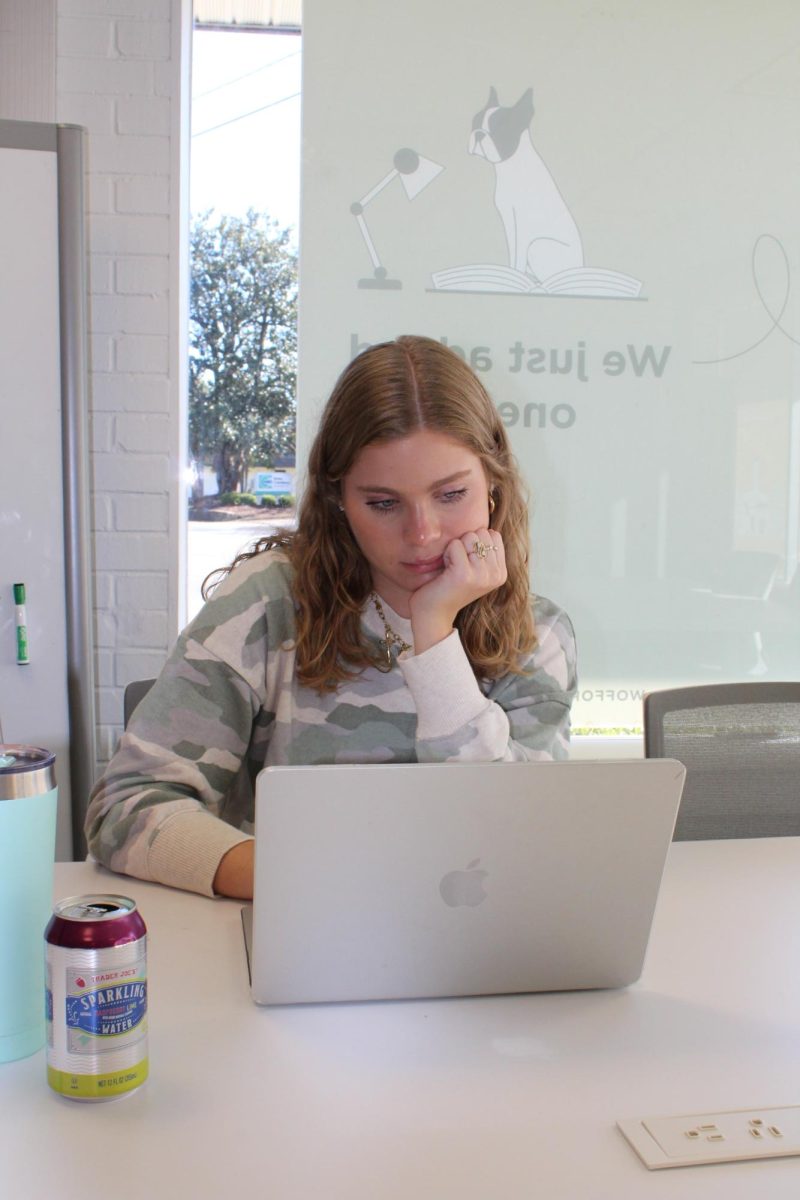On Friday, Oct. 15, Wofford Anti-Racism Coalition (WARC) held a sit-in protest that met at the Mungo Student Center, traveled across campus to President Nayef Samhat’s house and finally finished on the lawn of the Greek Village.
The purpose of the protest was to reiterate the demands formed by WARC during the 2020-21 school year, which were posted to the coalition’s blog shortly after last year’s Oct. 1 protest.
Demands included, but were not limited to renaming Carlisle, Shipp and Wightman dorms, adding at least one anti-racism course to all academic departments and requiring Inter-fraternity Council (IFC) organizations to abolish any BIPOC-exclusionary entrance systems in order to reopen their houses or host parties. The full list includes 34 demands.
Though the sit-in attracted a few dozen protestors, the turnout was noticeably less than that of WARC’s protest last year, with many of this year’s protestors being freshmen. As they walked around campus, the protestors chanted “We’re still here” and “We want action.” Many held signs with creative slogans or individual demands from WARC’s blog.
Upon arriving at Samhat’s house, some students read grievances to the crowd. Samhat was not present at the time.
After sitting briefly on the lawn of the President’s house, the protestors made their way to the lawn of the Greek Village to greet the Black Alumni Summit. The sit-in continued on the lawn as more testimonies were given, after which protestors were free to continue sitting on the lawn or leave.
WARC continues to receive mixed reviews. Many students have questioned WARC’s future and if it genuinely aids in the resolution of race issues on campus. Students have expressed worries about WARC being too inactive, and others have questioned what exactly is the organization’s objective.
“Our organization continued to meet biweekly, and due to the pandemic, all of our meetings and many educational events were held over zoom,” WARC executives said. “These events were advertised to all of Wofford through the daily announcements and our social media pages and could be easily accessed to those who looked or asked.”
“Our protest in 2020 was so large in participation that it raised concern of being a ‘superspreader event,’” said WARC executives.
A superspreader event is one in which diseases are spread more than usual, and the concern with this event was with COVID-19.
“Thankfully, it was not, but it definitely frightened a few,” continued WARC executives. “WARC takes all of these things very seriously and attempting to spark a transformation within an institution with over 100+ years of dark, racist history can be very traumatic.”
“I haven’t seen anything come out of WARC except for them aggressively advocating for a name change, which is wonderful, but there’s so much more they could be doing,” one student remarked.
Other students have expressed their dissatisfaction with the group’s exclusion of non-black students’ needs.
“WARC has not been as inclusive as I would like it to be,” one student said. “I believe many Brown students are left out of campus conversations about race issues, and it’s difficult to be a part of a group that excludes me.”
“We urge these individuals to join WARC and not only express their concerns but also assist us in finding a solution for those concerns,” WARC executives said in response. “It is never our intention to exclude any groups as we are built upon the premise of creating Wofford a safe place for everyone — not just on the basis of race but also sexuality, identity, and orientation as well.”
“We are continuing to collaborate with other diversity organizations on campus as well,” the representative continued. “Just this year we co-hosted a Latinx panel with OLAS (Organization of Latin American Students), and we are working toward hosting a variety of other events with others as well. Our efforts are not limited to just one group of people on campus, and we never want to come off that way.”
Some students, particularly first-year students, expressed optimism and excitement for the future of WARC and have a desire to see more of the organization’s events in the near future.
“From alumni, I got a lot of critiques,” WARC member Tayvian Gass ‘23 said. “The one that really stuck out to me is, ‘You don’t have to say anything every time you protest.’ Sometimes you don’t have to give demands. Protest itself is a language. You can just have a silent sit-in. You don’t have to always say something, per se, to say something.”
Alumni offered other suggestions to Gass, such as ensuring that WARC’s demands are consistent throughout the entirety of the protesting process and that WARC is certain that their demands can be achieved.
“I would interest them into joining WARC,” said Gass of students who believe WARC is merely performative. “You should join so that you can change your perspective on what’s really going on … If you still feel as though some things are showful, then change it; you can’t change something being on the corner.”
























